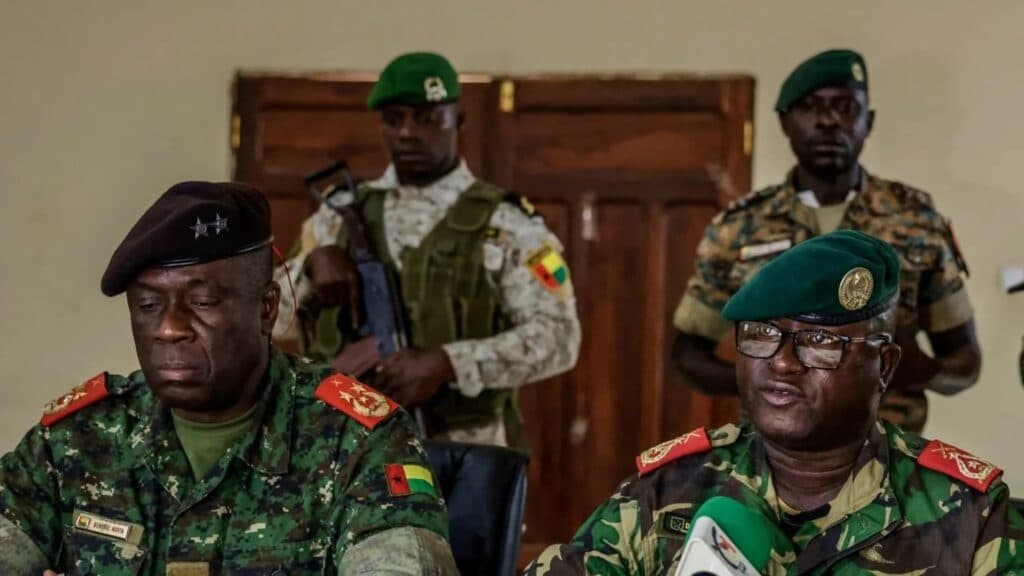We're loading the full news article for you. This includes the article content, images, author information, and related articles.
The military has taken control of Guinea-Bissau and detained President Umaro Sissoco Embaló, plunging the West African nation into turmoil days after a contentious election. The move triggers regional condemnation and adds to a wave of instability across West and Central Africa.

Soldiers in Guinea-Bissau seized power on Wednesday, November 26, 2025, arresting President Umaro Sissoco Embaló and suspending all state institutions just a day before the scheduled announcement of presidential election results. The move, which Embaló confirmed to French media as a "coup d'état," marks the latest in a series of military takeovers that have destabilized West Africa in recent years.
A group calling itself the "High Military Command for the Restoration of National Security and Public Order" appeared on state television to announce it had assumed full control of the country. Military spokesperson Dinis N'Tchama stated the intervention was necessary to thwart a plan by some politicians, allegedly with the help of a "well-known drug lord," to manipulate the election results and destabilize the nation. The military immediately suspended the electoral process, closed all land, sea, and air borders, halted media activities, and imposed a nationwide curfew from 9 p.m. to 6 a.m. local time.
The coup unfolded after gunfire was reported near the presidential palace, the interior ministry, and the National Electoral Commission headquarters in the capital, Bissau, around midday on Wednesday. President Embaló confirmed he was arrested in his office at the presidential palace. Other senior officials, including the army chief of staff, General Biague Na Ntan, and Interior Minister Botche Cande, were also reportedly detained.
The military takeover followed the presidential and legislative elections held on Sunday, November 23, 2025. Tensions had escalated as both incumbent President Embaló and his main opposition rival, Fernando Dias, had prematurely claimed victory ahead of the official results, which were due on Thursday, November 27. The credibility of the vote had been questioned by some civil society groups after the main opposition party, the PAIGC, was barred from contesting the presidential election. The regional bloc ECOWAS had also withdrawn its observer mission months prior to the vote.
A civil society coalition, the Popular Front, accused Embaló and the army of staging a "simulated coup" to prevent the release of unfavorable election results and cling to power. Guinea-Bissau has a long history of political instability, having experienced at least nine coups or attempted coups since gaining independence from Portugal in 1974. Embaló himself claimed to have survived multiple coup attempts during his first term, most recently in October 2025.
The African Union (AU) and the Economic Community of West African States (ECOWAS) swiftly condemned the military's actions. In a joint statement, their election observation missions described the takeover as a "blatant attempt to disrupt the democratic process" and called for the immediate release of detained election officials to allow for the conclusion of the electoral process. U.N. Secretary-General António Guterres stated he was following the situation "with deep concern" and appealed for restraint and respect for the rule of law.
The coup in Guinea-Bissau adds to a volatile political landscape in West Africa, where military juntas have seized power in Mali, Burkina Faso, Niger, and neighboring Guinea since 2020. This trend poses a significant challenge to regional bodies like ECOWAS, which have struggled to enforce democratic norms and have seen their influence tested by the formation of a separate Alliance of Sahel States by the military-led countries.
While there are no immediate, direct implications for Kenya, the instability in Guinea-Bissau is a setback for continental integration and democratic governance, principles that Kenya actively promotes. Earlier in 2025, President William Ruto and President Embaló had pledged to deepen diplomatic and trade ties between Kenya and Guinea-Bissau. During a state visit to Nairobi, the two leaders committed to leveraging the African Continental Free Trade Area (AfCFTA) to boost economic growth. President Ruto also announced plans for Kenya Airways to establish a route to Bissau and thanked President Embaló for endorsing Kenya's candidate for the African Union Commission Chairperson role. The coup disrupts these diplomatic overtures and underscores the fragility of political stability in parts of the continent, which can impact broader trade and security partnerships.
Keep the conversation in one place—threads here stay linked to the story and in the forums.
Sign in to start a discussion
Start a conversation about this story and keep it linked here.
Other hot threads
E-sports and Gaming Community in Kenya
Active 9 months ago
The Role of Technology in Modern Agriculture (AgriTech)
Active 9 months ago
Popular Recreational Activities Across Counties
Active 9 months ago
Investing in Youth Sports Development Programs
Active 9 months ago